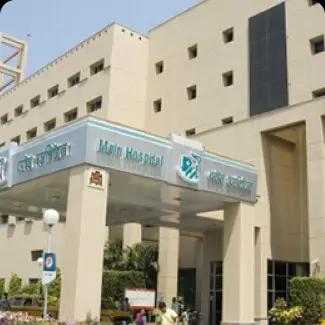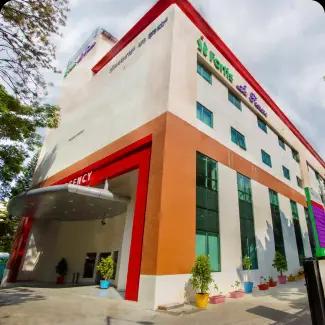
Hand and Wrist Surgery
Hand and wrist surgery treats a variety of conditions affecting bones, tendons, ligaments, nerves, and blood vessels. Procedures can range from minimally invasive carpal tunnel release to complex reconstructions after fractures or injuries. Recovery times vary depending on the surgery, but most aim to restore function and minimize pain.
Free Pick up and Drop
No Cost EMI
Post Surgery Care
Hand and wrist surgery treats a variety of conditions affecting bones, tendons, ligaments, nerves, and blood vessels. Procedures can range from minimally invasive carpal tunnel release to complex reconstructions after fractures or injuries. Recovery times vary depending on the surgery, but most aim to restore function and minimize pain.
Symptoms Of Hand and Wrist Surgery
Symptoms
Types of conditions
There are five main types of Hand and Wrist Surgery
Minimally invasive surgery
Tendon repair or reconstruction
Fracture fixation
Joint fusion
Nerve decompression
Minimally invasive surgery
Techniques like arthroscopy use small incisions and cameras for procedures like carpal tunnel release.
Types of Conditions That Require Hand & Wrist Surgery
- Carpal tunnel syndrome: Compression of the median nerve in the wrist causing pain, numbness, and tingling in the hand.
- Arthritis: Degenerative joint disease leading to pain, stiffness, and limited mobility in the hand or wrist.
- Fractures and dislocations: Broken or misaligned bones in the hand or wrist caused by trauma.
- Tendonitis and tendinosis: Inflammation or degeneration of tendons causing pain and difficulty moving the fingers or wrist.
- Trigger finger: A finger that gets stuck in a bent position due to a thickened tendon sheath.
Diagnosis
- Medical history: Your doctor will discuss your symptoms, including their onset, severity, and any aggravating or relieving factors. They will also inquire about your past medical history, occupation, and any previous injuries to the hand or wrist.
- Physical examination: The doctor will carefully examine your hand and wrist, assessing for tenderness, swelling, deformity, range of motion, and strength. They may also perform specific tests to evaluate nerve function and sensation.
- Imaging studies: X-rays are often the first-line imaging technique to visualize broken bones, arthritis, and other abnormalities in the bones and joints of the hand and wrist. Depending on the suspected condition, additional imaging like CT scans or MRIs might be used for a more detailed view of bones, soft tissues (tendons, ligaments), and nerves.
- Diagnostic injections: In some cases, injecting a local anesthetic into a specific area can temporarily relieve pain and help pinpoint the source of the problem. For example, an anesthetic injection in the carpal tunnel can temporarily alleviate symptoms associated with carpal tunnel syndrome.
- Nerve conduction studies and electromyography (EMG): These tests measure the electrical activity of nerves and muscles to assess nerve function and identify any damage to nerves or muscles in the hand or wrist.
Causes/Risk Factors
- Age: As we age, tissues become less elastic and healing can be slower, potentially increasing risks of infection or complications.
- Underlying health conditions: Chronic conditions like diabetes, obesity, or autoimmune diseases can impair healing and increase infection risk.
- Smoking: Smokers have poorer circulation which can hinder healing and increase the risk of wound complications.
- Severity of the condition: Complex surgeries or those involving extensive reconstruction carry a higher inherent risk compared to simpler procedures.
- Previous surgery: Scar tissue from prior surgeries in the same area can complicate the current surgery and increase infection risk.
- Anesthesia complications: While uncommon, risks associated with anesthesia like allergic reactions or breathing difficulties exist for any surgery.
Why is Hand & Wrist Surgery Performed?
- Fixing pinched nerves: Like carpal tunnel release, this frees a squished nerve in your wrist to stop pain and tingling.
- Sewing up torn tendons: Surgeons stitch ripped tendons back together to get your fingers and wrist moving smoothly again.
- Rebuilding broken stuff: If a bone breaks badly, they might use screws, plates, or even grafts to put it all back together.
- Fusing bones together: In very bad arthritis, they might connect bones permanently to stop pain and make the joint more stable.
- Replacing worn-out parts: Just like a hip replacement, they can swap out a damaged joint in your hand or wrist for a new, artificial one.
- Fixing stuck fingers: If a finger gets stuck bent, a surgeon can release the tightness and let it straighten again.
- Removing bumps and lumps: Sometimes fluid builds up in your hand, and surgery can take those bumps away.
- Smoothing out a tight palm: This surgery loosens thickened tissue that might be making it hard to bend your fingers.
Preparing for Surgery
Here's a breakdown of key steps involved in preparing for hand and wrist surgery:
Pre-operative Consultation
- Detailed discussion with your surgeon: Discuss the surgery itself, potential risks and benefits, and recovery expectations.
- Medical history review: Inform your doctor about any medical conditions, medications you take, and allergies.
- Physical examination: The surgeon will assess your hand and wrist, and may recommend additional tests like X-rays.
Pre-operative Instructions
- Fasting: You'll likely be instructed to avoid eating or drinking anything (except water) for a specific period before surgery (usually 8-12 hours).
- Medications: Your doctor may advise stopping or adjusting certain medications before surgery.
- Blood thinners: If you take blood thinners, your doctor will advise on stopping or adjusting them before surgery to minimize bleeding risks.
- Smoking cessation: Smoking can hinder healing and increase infection risk. Quitting smoking well in advance of surgery is recommended.
- Clothing: Wear loose-fitting clothing that allows easy access to the surgical site (hand/wrist).
- Transportation and assistance: Arrange for someone to drive you home after surgery and potentially help you with daily activities during initial recovery.
Additional Considerations
- Showering/Bathing: Inquire about showering or bathing instructions before surgery, and any precautions for keeping the surgical site clean and dry.
- Valuables: Leave valuables at home, as you won't be able to access them easily during post-surgical recovery.
- Exercises: Your doctor might recommend specific hand or wrist exercises to improve flexibility and range of motion before surgery, aiding post-surgical recovery.
Recovery
Immediately After Surgery
- You'll likely spend some time in a recovery room before going home.
- Your hand or wrist will be bandaged or splint to immobilize it and promote healing.
- You might experience some pain, which can be managed with medication.
Here are some additional tips for a successful recovery:
- Maintain good hand hygiene to prevent infection.
- Attend all follow-up appointments with your doctor or therapist.
- Communicate any concerns or setbacks you experience to your healthcare provider.
- Be patient with your recovery. Regaining full function takes time and consistent effort
Your journey to good health begins here

Accredited Hospitals
Nationally accredited hospitals for high-quality care

Multi-language Support
Convey your needs in the language you're most comfortable in

Travel Booking Assistance
Seamless booking assistance for your healthcare journey

Personalised Treatment Plans
A treatment journey tailored to all your preferences and needs

Unparalleled Hospitality
Experience exceptional hospitality during your stay

Easy Medical Visa Approvals
Dedicated assistance for medical visa requirements
Plan your healthcare journey with Karetrip!
India’s Best Hospitals are Partnered With Karetrip
Access World-Class facilities from top Hospitals across India
Consult with India’s most experienced doctors
Experience premium care from India’s leading specialists

Dr. Abrar Ahmed
Orthopaedic Surgeon
34+ Years Of Experience

Dr. K P Kosygan
Orthopaedic Surgeon
23+ Years Of Experience

Dr. Madan Mohan Reddy
Orthopaedic Surgeon
28+ Years Of Experience

Dr. Vijaya Mohan S
Orthopaedic Surgeon
19+ Years Of Experience

Dr. V R K V Prasad Gourineni
Orthopaedic Surgeon
25+ Years Of Experience

Dr. Billy Paul Wilson
Orthopaedic and Joint Replacement Surgeon
25+ Years Of Experience
Cost Estimation
Learn about the expenses involved in the procedure and what factors affect them.

Several factors can affect the cost estimation in hand and wrist surgery.
- Hospital type and location: Treatment costs can vary depending on the hospital's reputation, location (urban vs. rural areas), and the overall cost of living in the region. High-end hospitals and major cities tend to have higher charges.
- Surgeon's fees and experience: The experience and reputation of the surgeon performing the surgery can influence their fees.
- Facility fees: Costs associated with using the hospital's surgical suites, radiation equipment, and other resources contribute to the overall bill.
- Anesthesia fees: The type of anesthesia used during surgery (general vs. local) can affect the cost.
- Length of hospital stay: Complications or additional procedures during treatment can lead to a longer stay, increasing the cost.
- Insurance coverage: Deductibles, co-pays, and out-of-pocket expenses will vary depending on your insurance plan. Some plans may have limited coverage for certain treatments or medications.
The average cost of the Hand and Wrist Surgery in India is around ₹50,000 to ₹60,000.

₹60,000
High Cost
₹55,000
Average Cost
₹50,000
Low Cost
The LIST of AVERAGE COST of the Hand and Wrist Surgery across TOP 4 cities in India in Indian Rupee (INR) is as follows :
City
Lowest Cost
Average Cost
Highest Cost
Mumbai
₹50,000
₹55,000
₹60,000
Delhi
₹50,000
₹55,000
₹60,000
Hyderabad
₹50,000
₹55,000
₹60,000
Chennai
₹50,000
₹55,000
₹60,000
Commonly Asked Questions
Do I always need surgery for my hand or wrist pain?
Not always. Depending on the cause, conservative treatments like splinting, medication, or physical therapy might be sufficient.
What are the benefits of minimally invasive surgery?
Smaller incisions, less tissue disruption, quicker recovery time, and potentially less pain.
Will I need physical therapy after surgery?
Most likely, yes. Physical therapy helps regain strength, flexibility, and range of motion in your hand or wrist.
How long will I be in pain after surgery?
Pain management is a priority. You'll experience some pain initially, but medication and ice therapy can help control it.

Do you still have a query?


"I had a successful surgery at Fortis Escorts Hospital, and it was all thanks to Karetrip's help in finding the right hospital for me. The entire process was smooth and stress-free, with Karetrip handling all the arrangements and answering any questions I had. The medical team at the hospital was outstanding, and the facilities were top-notch. I highly recommend Karetrip to anyone looking for a tension-free healthcare experience."
Read MoreFatima
Chattogram


"Thanks to Karetrip, I got connected with MAX Hospital in New Delhi. The team guided me through every step – from finding the right doctor to handling travel and visas. They made a daunting process feel like a breeze. The care I received at MAX Hospital was outstanding, and I can't thank Karetrip enough for making it possible. They truly put patients first and go the extra mile to ensure a smooth healthcare journey. I'm grateful beyond words!"
Read MoreHasan
Dhaka


"At first, I was unsure about having a medical procedure done in a foreign country. However, Karetrip's team at Indraprastha Apollo Hospital made me feel much better. The hospital was very clean, modern, and had everything they needed to help me. The staff were very kind and did everything they could to make me feel comfortable. I'm really happy with how my treatment turned out, and I appreciate Karetrip for making it easy and stress-free."
Read MoreImran
Sylhet
 Google Reviews4.9/5
Google Reviews4.9/5




I had a successful surgery at Fortis Escorts Hospital, and it was all thanks to Karetrip's help in finding the right hospital for me. The entire process was smooth and stress-free, with Karetrip handling all the arrangements and answering any questions I had. The medical team at the hospital was outstanding, and the facilities were top-notch. I highly recommend Karetrip to anyone looking for a tension-free healthcare experience.
Fatima
Chattogram
 Google Reviews4.9/5
Google Reviews4.9/5



















